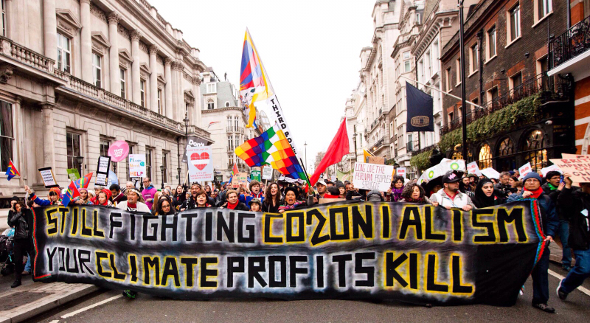At the website libcom.org, the radical environmental collective Out of the Woods responds to a widely circulated piece by writer, poet, and climate activist Paul Kingsnorth entitled “The lie of the land: does environmentalism have a future in the age of Trump?,” originally published in The Guardian last month. Kingsnorth’s piece frames the struggle to protect the environment in nationalist terms, arguing that Britain is justified in limiting immigration and withdrawing from the EU if it helps preserve the natural landscapes and resources that define the country. But Out of the Woods argues that this conception of environmentalism is fascist in character, if not intent. It recruits the natural world to shore up nationalist sentiment and white supremacy, and erases the histories of indigenous populations who occupied the land prior to the founding of modern nation-states. Check out an excerpt from the response below, or read the full text here.
In fact, ‘climate change’ is mentioned only twice - each time in relation to forms of environmentalism that Kingsnorth pits himself against; and it is startling to note how peripheral Kingsnorth’s concern in this regard appears. There is not a single mention of climate change’s devastating impact on food production; nor on how it fuels conflicts, including the civil war in Syria. Rather, his environmental concern is driven by a privileged romanticism that culminates in the nation state: ‘wild’ ‘nature’ contributes to the distinctiveness of the nation, providing it with some of that ‘colour, beauty and distinctiveness’.
This nature is framed as part of the ‘birthright’ of a nation, and in a disturbingly völkisch turn-of-phrase Kingsnorth states that if ‘you want to protect and nurture your homeland - well, then, you’ll want to nurture its forests and its streams too’. This desire to wrap forests in the flag clears the way for what the critical scholar of ecofascism Peter Staudenmaier calls a ‘deadly connection between love of land and militant racist nationalism.’
Recalling Kingsnorth’s dig at those who challenge gender identities, we would add that this ‘love’ of the land is also a deeply gendered, thoroughly heteronormative romance. As Lee Edelman writes:
‘Nature [is] the rhetorical effect of an effort to appropriate the ‘natural’ for the ends of the state. It is produced, that is, in the service of a statist ideology that operates by installing pro-procreative prejudice as the form through which desiring subjects assume a stake in a future that always pertains, in the end, to the state, not to them’.
For Kingsnorth, the reproduction of the nation state is inseparable from the reproduction of its ‘nature.’ His writing falls back on the imagery of ‘mother earth:’ pure, bountiful yet fragile, a set of ideal characteristics which can then be imposed on gendered subjects. The idealised reproduction of nature can then be used to discipline human reproduction, which is itself the precondition of the nation state - after all, what is a ‘birthright’ without births? When Kingsnorth talks of the desire to ‘nurture your homeland,’ we can see this as the implicit operation of what Edelman calls ‘installing pro-procreative prejudice’ - the word ‘nurture’ has a rich subtext of child care and gendered labour.
The quiet assumption is that the nuclear family will continue to function, that kids will keep being born and that women will continue to do the (unwaged) work of caring for them. On this, Kingsnorth’s national future depends, and thus we can recognise it as an iteration of what Edelman calls ‘reproductive futurism.’
Image via libcom.org/Out of the Woods.
